人教八年级上册初二英语Unit1 SectionA笔记
新人教版八年级上册英语Unit1重点知识归纳
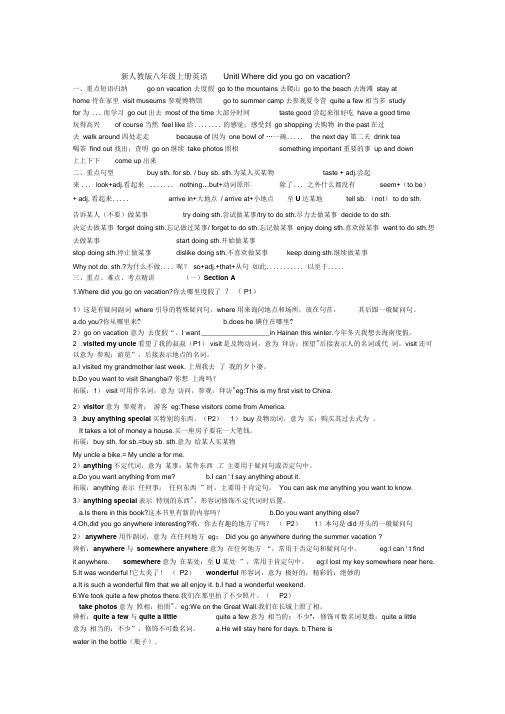
新人教版八年级上册英语Unitl Where did you go on vacation?一、重点短语归纳go on vacation 去度假go to the mountains 去爬山go to the beach去海滩stay athome 待在家里visit museums 参观博物馆go to summer camp去参观夏令营quite a few 相当多studyfor为 ... 而学习go out出去most of the time大部分时间taste good尝起来很好吃have a good time玩得高兴of course当然feel like给........ 的感觉;感受到go shopping去购物in the past在过去walk around 四处走走because of 因为one bowl of …一碗..... the next day 第二天drink tea喝茶find out 找出;查明go on继续take photos照相something important 重要的事up and down上上下下come up出来二、重点句型buy sth. for sb. / buy sb. sth.为某人买某物taste + adj.尝起来... look+adj.看起来 ....... nothing…but+动词原形除了... 之外什么都没有seem+(to be)+ adj. 看起来..... arrive in+大地点/ arrive at+小地点至U达某地tell sb. (not) to do sth.告诉某人(不要)做某事try doing sth.尝试做某事/try to do sth.尽力去做某事decide to do sth.决定去做某事forget doing sth.忘记做过某事/ forget to do sth.忘记做某事enjoy doing sth.喜欢做某事want to do sth.想去做某事start doing sth.开始做某事stop doing sth.停止做某事dislike doing sth.不喜欢做某事keep doing sth.继续做某事Why not do. sth.?为什么不做.... 呢?so+adj.+that+从句如此........... 以至于.....三、重点、难点、考点精讲(一)Section A1.Where did you go on vacation?你去哪里度假了?( P1)1)这是有疑问副词where引导的特殊疑问句,where用来询问地点和场所,放在句首,其后跟一般疑问句。
【八年级上册】unit1sectionA课文重难点讲解
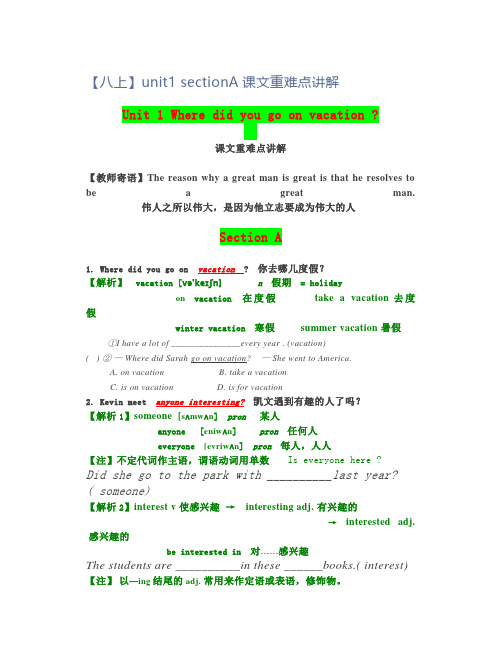
【八上】unit1 sectionA课文重难点讲解Unit 1 Where did you go on vacation ?课文重难点讲解【教师寄语】The reason why a great man is great is that he resolves to be a great man.伟人之所以伟大,是因为他立志要成为伟大的人Section A1. Where did you go on vacation? 你去哪儿度假?【解析】vacation [və'keɪʃn]n假期= holidayon vacation 在度假take a vacation 去度假winter vacation 寒假summer vacation 暑假①I have a lot of _______________every year . (vacation)( ) ②— Where did Sarah go on vacation? — She went to America.A. on vacationB. take a vacationC. is on vacationD. is for vacation2. Kevin meet anyone interesting?凯文遇到有趣的人了吗?【解析1】someone [sʌmwʌn]pron 某人anyone [eniwʌn] pron任何人everyone [evriwʌn] pron每人,人人【注】不定代词作主语,谓语动词用单数Is everyone here ?Did she go to the park with __________last year? ( someone)【解析2】interest v 使感兴趣→interesting adj. 有兴趣的→interested adj.感兴趣的be interested in 对……感兴趣The students are __________in these ______books.( interest)【注】以—ing结尾的adj. 常用来作定语或表语,修饰物。
人教版英语八年级上册第一单元至第十单元知识点、重点笔记

Unit 1 where did you go on vacationImportant phrases: (重点短语)1.去夏令营2.买一些特别的东西3.为考试准备4.跟某人外出5.去纽约市6.好久不见7.度假8.去某个有趣的地方9.大多数时间10.给母鸡喂食11.除—一无所有12.当然,自然13.似乎有点无聊14记日记15.令人愉快地活动16.到达17.决定去海边18.尝试滑翔伞运动19.感觉像一只小鸟20.想要骑车21.中国商人的房子22.在过去23许多古老的建筑24步行到山顶25.开始下雨26.等了一个多小时的火车27.下大雨28.忘记带一把雨伞29.又湿又冷30.因为恶劣的天气31.带着足够的钱32.足够大33.好像有点饿34.与—一样好35 不如----好36.照了相当多的相片37.停下来喝水38.继续前进39.激动地跳跃40.二十分钟后41.如此---以至于42.升起43.发现-- 44.尝起来很好吃45.尽力去做某事46.停止做某事47.不喜欢做某事48.继续做某事49.一碗米饭50为某人买某物重点句子where did you go on vacation?go on vacation 去度假2.Visited my uncle重点:visit为及物动词,“拜访,探望,参观,游览”后接人或地点改错Did you visit in china?3. Did you buy anything special?1)buy 的过去式为boughtbuy sth.for sb.=buy sb sth.我为Tom买了一个礼物2)anything 不定代词“某物,某事”主要用于疑问句和否定句中一旦anything用于可定句中,则意为“任何事,任何东西”Eg You can ask me anything you want to know3)★形容词修饰不定代词要后置4.Oh,did you go anything interesting?这是一般过去时中不含was/were的句子在变一般疑问句时,需用助动词did。
人教版八年级英语上册笔记1--10单元(原创整理,超详细)
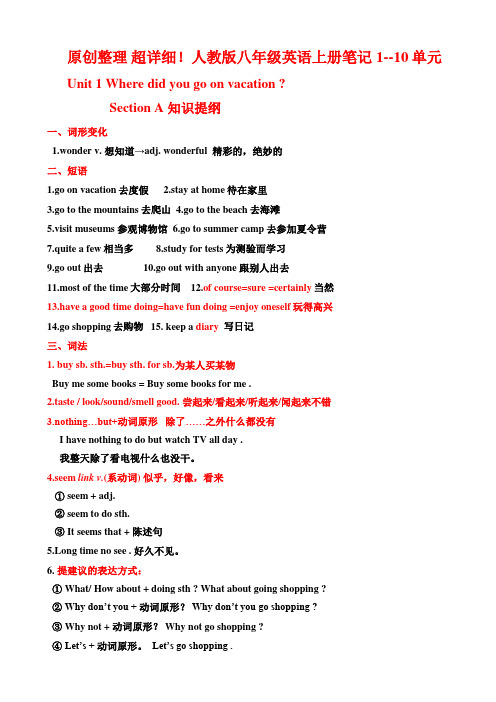
原创整理超详细!人教版八年级英语上册笔记1--10单元Unit 1 Where did you go on vacation ?Section A 知识提纲一、词形变化1.wonder v. 想知道→adj. wonderful 精彩的,绝妙的二、短语1.go on vacation去度假2.stay at home待在家里3.go to the mountains去爬山4.go to the beach去海滩5.visit museums 参观博物馆6.go to summer camp去参加夏令营7.quite a few相当多 8.study for tests为测验而学习9.go out出去 10.go out with anyone 跟别人出去11.most of the time大部分时间 12.of course=sure =certainly当然13.have a good time doing=have fun doing =enjoy oneself玩得高兴14.go shopping去购物 15. keep a diary 写日记三、词法1. buy sb. sth.=buy sth. for sb.为某人买某物Buy me some books = Buy some books for me .2.taste / look/sound/smell good. 尝起来/看起来/听起来/闻起来不错3.nothing…but+动词原形除了……之外什么都没有I have nothing to do but watch TV all day .我整天除了看电视什么也没干。
4.seem link v.(系动词) 似乎,好像,看来① seem + adj.② seem to do sth.③ It seems that + 陈述句5.Long time no see . 好久不见。
6. 提建议的表达方式:① What/ How about + doing sth ? What about going shopping ?②Why don’t you + 动词原形?Why don’t you go shopping ?③ Why not + 动词原形? Why not go shopping ?④Let’s + 动词原形。
Unit1 sectionA 知识点讲解 人教版英语八年级上册

八年级上册Unit1Section A单词1. anyone ['eniwʌn] pron.任何人助记any(det.任何的)+one(det.一)= anyone 拆分记忆法典例I don't want anyone to touch the book.我不想让任何人碰这本书联想some(一些)+one(一)= someone(某人)2.anywhere ['eniweə(r)] adv.在任何地方助记any(det.任何的)+ where(adv.在哪里)=anywhere典例Did you go anywhere interesting? 你去过任何有趣的地方吗?I can' t find my pencil anywhere.我在哪儿都找不到我的铅笔联想no(没有)+ where(在哪里)= nowhere(无处,哪里都不)3.wonderful ['wʌndəfl] adj.精彩的;绝妙的助记wonder(n惊奇;奇迹)+(形容词后缀)= wonderful典例a wonderful idea(作定语)一个很棒的主意I think the talk shows are wonderful.(作表语)我认为访谈节目很精彩。
近义fantastic adj极好的常用词缀后缀-ful常加在动词或名词之后帮助构成形容词。
如:use(n.使用)+ful→ useful (adj.有用的),success(n.成功)+ful→successful(adj.成功的), help(v.&n.帮助)+ful→helpful(adj.有帮助的)。
4.few /fju:/ adj.&pron. 不多;很少典例Very few students learn Latin now.(作形容词)现在学拉丁语的学生很少。
Few of us know the truth.(作代词)我们当中没有几个人知道真相。
八年级上册英语第一单元知识点笔记
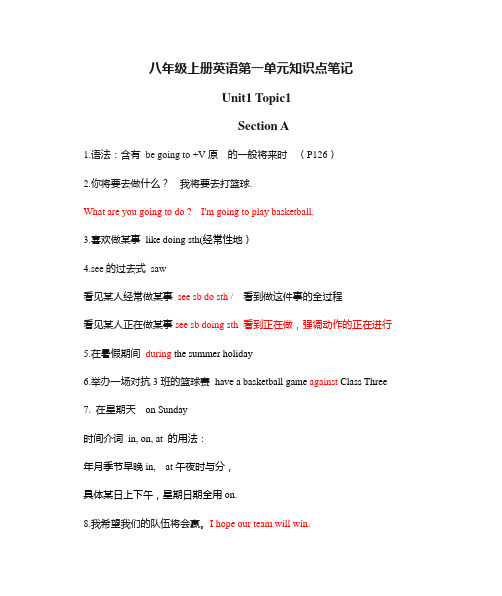
八年级上册英语第一单元知识点笔记Unit1 Topic1Section A1.语法:含有be going to +V原的一般将来时(P126)2.你将要去做什么?我将要去打篮球.What are you going to do ? I'm going to play basketball.3.喜欢做某事like doing sth(经常性地)4.see的过去式saw看见某人经常做某事see sb do sth /看到做这件事的全过程看见某人正在做某事see sb doing sth 看到正在做,强调动作的正在进行5.在暑假期间during the summer holiday6.举办一场对抗3班的篮球赛have a basketball game against Class Three7. 在星期天on Sunday时间介词in, on, at 的用法:年月季节早晚in, at午夜时与分,具体某日上下午,星期日期全用on.8.我希望我们的队伍将会赢。
I hope our team will win.我也是. Me, too.9.你愿意来为我们加油吗?Would you like to come and cheer us on?当然,我愿意Sure,I'd love to.cheer sb on ( sb用的是人称的宾格, 因为跟在动词后)10. 你更喜欢哪一种运动,A or B ?Which sport do you prefer,A or B?11. prefer的用法(1) prefer + 名词= like +名词+ better如:I prefer apples = I like apples better(2) prefer A to B (和B比起来更喜欢A )(3) prefer doing sth更喜欢做某事(4) prefer doing sth to doing sth和做某事比起来,更喜欢做某事(更喜欢前面的,即prefer 后紧跟的动作)(5) prefer to do sth rather than do sth和做某事比起来,更喜欢做某事(更喜欢前面的,即prefer 后紧跟的动作)12. 你划船多吗? 是的,非常多/ 不,很少。
八年级英语上册一单元笔记

八年级英语上册一单元笔记人教版八年级英语上册第一单元笔记。
一、重点单词。
1. anyone.- 任何人,常用于否定句和疑问句中。
例如:Did you meet anyone interesting at the party?(你在聚会上遇到有趣的人了吗?)- 肯定句中用someone。
例如:There is someone waiting for you outside.(外面有人在等你。
)2. anywhere?- 在任何地方,也是多用于否定句和疑问句。
如:I can't find my book anywhere.(我到处都找不到我的书。
)- 肯定句中用somewhere。
例如:I want to go somewhere warm for my holiday.(我想去某个暖和的地方度假。
)3. wonderful.- 精彩的,绝妙的。
例如:We had a wonderful time at the concert.(我们在音乐会上度过了一段美妙的时光。
)- 可以用来形容事物或经历非常好。
4. few与a few,little与a little。
- few和a few修饰可数名词复数。
few表示几乎没有,含否定意义;a few表示有一些。
例如:There are few apples on the tree.(树上几乎没有苹果了。
)There are a few students in the classroom.(教室里有一些学生。
)- little和a little修饰不可数名词。
little表示几乎没有,含否定意义;a little表示有一点。
例如:There is little water in the glass.(杯子里几乎没有水了。
)There is a little milk in the fridge.(冰箱里有一点牛奶。
)5. most.- 大多数,大部分。
例如:Most students like English in our class.(我们班大多数学生喜欢英语。
人教版八年级英语上册1-10单元学霸笔记

⼈教版⼋年级英语上册1-10单元学霸笔记Unit1单元⼩结⼀、重点单词:anyone, wonderful, something, nothing, myself, bored, someone, diary, enjoyable, activity, decide, bird, bicycle, building, trader, wonder, difference, wait, umbrella, below, enough, hungry, duck, dislike⼆、词性变换:me (反⾝代词)enjoy (形容词)decide (名词)build (名词)difference (形容词)wet(反义词)hungry(名词)like (反义词)expensive(反义词)wonder (形容词)active (名词)三、重点短语:go on vacation, stay at home, go to the mountains, visit museums, go out, take photos, quite a few, of course, something special, have a good/fun time, feel like, walk up to, because of, decide to do, ride bicycles to, make notes, find out, go on, come up. study fora test, long time no see, most of the time, arrive in, along the way, go to the beach, upand down,四、重点语法结构:1.⼀般过去时态(标志词,句式)I was a middle school student two years ago.He went to the beach yesterday.2.不定代词⽤法--thing,指物,--one,指⼈。
人教版八年级英上UNIT1 Section A知识点

人教版八年级英上UNIT1 Section A知识点1. Where did句型这个句型是一般过去时的特疑问句,问地点,did是动词,注意后面的实义动词要用原形,eg:Where did you go on vacation?你去哪儿度假了?Sanya.三亚.2.anyone的用法anyone作代词,意为“任何,同义词为 anybody,常用于否定句疑问句或条件状语从句中,若强调指“任何人”可用于肯定句中, anyone作主语时,谓语动词用单数形式。
Eg: Anyone in our town knows him.我们镇上的任何一个人都认识他3. quite a few相当多;不少后面跟可数名词复数形式辨析few,a few, little与 a littlefew/a few修饰可数名词little/a little 修饰不可数名词;few/little表否定;a few/ a little表肯定4.anywhere的用法anywhere作副词,意为“在任何地方”,前面不用介词to,常用在否定句或疑问句中有形容词修饰时需后置。
eg: Did Grace visit anywhere wonderful in Beijing?格雷丝参观过北京的一些精彩的地方吗?5.most的用法◆most作形容词,意为“大多数的;大部分的”。
修饰不可数名词或可数名数复数,名词前不加冠词等修饰词。
Eg:Most girls like beautiful clothes.大多数女孩喜欢漂亮的衣服◆most作副词,意为“最;很;非常”eg:What did you enjoy most? 你最欣赏的是什么?◆most作代词,常与of连用意为“……中的大多数”,修饰不可数名词或可数名词复数,名词前要加冠词或其他修饰词。
若与代词连用,代词用宾格,cg:most of them/us他们/我们中的大多数人Most of teachers 大多数老师6.some和any的区别Some,any都可意为“一些”some一般用于否定句中,而any则用于一般疑问句和否定句中。
人教版八年级上各单元英语笔记
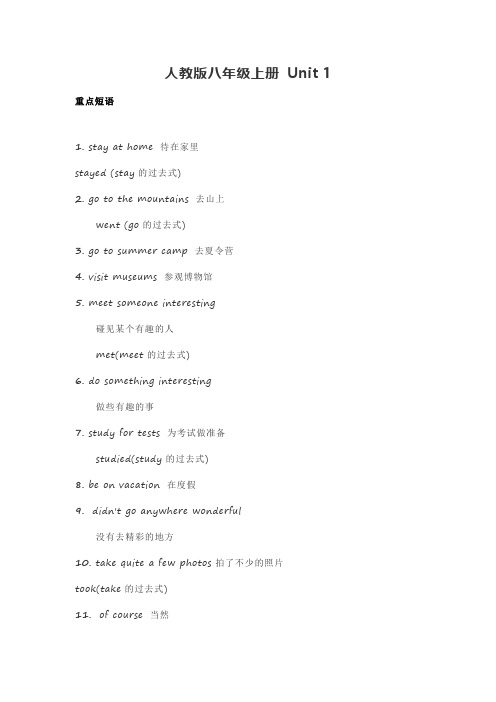
人教版八年级上册Unit 1 重点短语1. stay at home 待在家里stayed (stay的过去式)2. go to the mountains 去山上went (go的过去式)3. go to summer camp 去夏令营4. visit museums 参观博物馆5. meet someone interesting碰见某个有趣的人met(meet的过去式)6. do something interesting做些有趣的事7. study for tests 为考试做准备studied(study的过去式)8. be on vacation 在度假9. didn't go anywhere wonderful没有去精彩的地方10. take quite a few photos拍了不少的照片took(take的过去式)11. of course 当然12. go to a friend's farm 去朋友的农场13. in the countryside 在乡下14. feed some hens and see some baby pigs 喂母鸡和看到一些小猪仔fed(feed的过去式);saw(see的过去式) 15. seem to be bored 看上去很无聊It seems that... 看来……16. keep a diary/keep diaries 记日记kept(keep的过去式)17. an activity 一次活动activities(activity的复数形式)18. an expensive gift 一份昂贵的礼物19. an exciting vacation一个令人兴奋的假期20. buy sth. for sb.=buy sb. sth. 为某人买某物bought(buy的过去式)21. have a good time 玩得开心have a good time doing sth. 做某事开心22. find something enjoyable 找点乐子found(find的过去式)23. arrive in (+大地方)/arrive at (+小地方)get to (+地方)reach (+地方)到达……24. decide to go to the beach 决定去海滩decide to do sth. 决定做某事25. try to do sth. 尽力做某事try doing sth. 尝试做某事have a try 尝试一下26. feel like sth. 感觉像某物feel like doing sth. 想做某事27. ride bicycles to sp. 骑自行车去某地rode(ride的过去式)28. a lot of new buildings 许多新建筑物29. the houses of the Chinese traders中国商人的房子30. enjoy walking around 喜欢到处走走31. walk up to the top 走到山顶32. wait over an hour for the train等火车一个多小时33. rain hard 雨下得大34. be/get wet 淋湿got(get的过去式)35. have an umbrella 有一把雨伞36. because of 因为;由于37. can't see anything below看不见下面的东西38. bring enough money 带足够的钱brought(bring的过去式)39. along the way 沿途40. another two hours=two more hours再两小时41. in the shopping center 在购物中心42. on our school trip 在我们学校郊游中43. a bag with food and water一个装着食物和水的袋子44. find out 弄清楚;查明白45. so... that...如此……以至于……46. Beijing duck 北京烤鸭47. keep doing sth. 继续做某事48. go on 继续49. jump up and down in excitement兴奋得跳上跳下50. start to come up 开始出现重点句型1. Long time no see. 好久不见。
Unit1笔记人教版八年级上册英语

八年级上学期英语笔记(1)Unit 1 Where did you go on vacation?I. Important phrases.go on vacation去度假stay at home待在家里go to the mountains去山区go to summer camp去夏令营visit my uncle看望我叔叔visit museums参观博物馆study for tests备考quite a few相当多take photos 拍照most of the time大部分时间keep a diary写日记shopping center购物中心learn something important 学习重要的事情find out发现;查明up and down上上下下,来来回回in/with excitement 兴奋地;激动地ride a bicycle/bicycle s to骑自行车去twenty minutes later 20分钟以后from the top of the hill从山顶上keep doing sth保持做某事another two hours=two more/other hours又两个小时in the past在过去buy something special 买了特别的东西along the way沿途in the countryside/country在乡下the next day第二天II.Grammar.1. 复合不定代词1). 复合不定代词的构成:由some,any,every,no加上one,body,thing构成的不定代词称为复合不定代词。
具体如下2). 复合不定代词的用法总结:①复合不定代词相当于名词,在句中可以作主语、宾语和表语。
②带some的复合不定代词常用于肯定句中,(注:但在表示请求,建议,反问等的疑问句中并希望得到对方的肯定回答时,常用带some 的复合不定代词);带any的复合不定代词常用于否定句、疑问句中,(注:anyone/anybody, anything 也可用于肯定句中,表示“任何人,任何事”)Would you like something to drink?③Did you buy anything special?④e.g. Everything begin s to grow in spring.Money isn’t everything.3) 复合不定副词有: somewhere, anywhere, everywhere,nowheree.g. Did you go anywhere interesting?2. 反身代词当句子的主语与宾语一致时,宾语用反身代词常用短语:teach oneself = learn ...by oneself 自学 enjoy oneself过得愉快help oneself to 随便吃/用…… make oneself at home 别拘束 e.g. He bought himself a book last week. They enjoyed themselves yesterday evening. III Key points.e.g. I do quite a little homework every day.There are quite a few books in the library.【注】主语是名词时,其前必须要加限定词。
人教新目标英语八年级上册 Unit 1 sectionA语法知识点总结

人教新目标英语八年级上册Unit 1 sectionA语法知识点总结Unit 1 Where did you go on vacation?一般过去时态的概念:1.表示过去某时间发生的动作或存在的状态。
2.表示过去经常性习惯性的动作。
一般过去时常用的标志词有:yesterday,the day before yesterday,last week/month/year, just now, …ago,in+过去时间…一.用Be动词的一般过去时(1)肯定句式:主语+ was / were + 其它.(2)否定句式:主语+ wasn’t /weren’t+ 其它.(3)一般疑问句:Was/Were + 主语+ 其它?肯定回答:Yes,主语+ was / were .否定回答:No,主语+ wasn’t /weren’t.(4)特殊疑问词+was/were+主语+其他?肯定句:The air was clean yesterday.否定句:The air wasn't clean yesterday.一般疑问句:Was the air clean yesterday?肯定回答:Yes, it was.否定回答:No, it wasn't.特殊疑问句:How was the air yesterday?二.行为动词(v.)的一般过去时态(1)肯定句式:主语+ v-ed+ 其它.【do , does---did】(2)否定句式:主语+ didn’t + v原形+ 其它. 【did not = didn’t】(3)一般疑问句:Did + 主语+ v原形+ 其它?肯定回答:Yes,主语+did.否定回答:No,主语+did’t.(4)特殊疑问词+did+主语+v.原形+其他?肯定句:I rode a horse last Sunday.否定句:I didn‘t ride a horse last Sunday.一般疑问句:Did you ride a horse last Sunday? 肯定回答:Yes, I did.否定回答:No, I didn't.特殊疑问句:(1)What did you do last Sunday?(2)When did you ride a horse?三、动词过去式的构成1. 规则动词的过去式1) 一般情况下,在动词原形后面加-ed。
人教新目标八年级英语上册Unit 1 Where did you go on vacation?知识点归纳

人教新目标八年级英语上册Unit 1 Where did you go on vacation?知识点归纳第1课时 Section A(1a2d)anyone pron.任何人。
相当于anybodyanything pron.任何东西,任何事物。
常用于否定句或疑问句中anywhere adv. 在任何地方。
相当于anyplacewonderful adj. 精彩的,绝妙的。
其同义词有great, nice, excellent等few adj. & pron. 不多,很少。
用来修饰或指代复数可数名词,表示否定【拓展】(1)anyone的相关用法·anyone表示“某人”,常用于否定句、疑问句及条件句中。
如:He will not tell anyone, the secret will die with him. 他不会告诉任何人,这个秘密将与他一起进入坟墓。
·anyone用作主语,谓语动词用单数。
若需用代词代替,可用单数he, him 或复数they, them。
如:Anyone who likes this film can go and see it this evening. 凡是想看这部电影的人今晚都可以去看。
If anyone comes, please ask him (them) to wait for a moment. 如果有人来,请让他(他们)稍等。
·anyone被形容词修饰时,形容词应置于其后。
如:Do you know anyone famous in this field? 你认识这个领域的名人吗?(2)anything为不定代词,后面可接形容词,如special, wonderful, interesting 等。
当形容词修饰不定代词时,要将形容词放在不定代词的后面。
符合此用法的不定代词还有something, nothing, somebody, anybody,nobody, someone, anyone等。
八年级上册第一单元sectiona知识点

八年级上册第一单元sectiona知识点八年级上册第一单元Section A知识点八年级的语文学习是十分重要的,特别是首单元,它为接下来的学习奠定了基础。
本文将对八年级上册第一单元Section A所需学习的知识点进行详细讲解。
1. 词汇学习新单元,首先需要掌握的是信汇。
Section A中包含了很多常用的词汇,比如:adventure, basic, exist, select等。
在词汇学习方面,同学们可以多看新闻、听英文歌、读英文书籍等多种方式,以便丰富词汇量,增强语感。
2. 语法闫老师在课堂上讲解了一些基础语法知识,比如名词、动词、形容词、副词等的基本概念和用法。
这些语法知识在英语学习中至关重要,对于加深对英语语法的理解和运用都有帮助。
3. 时态英语时态的正确运用是英语写作和口语表达的基础。
在Section A中,我们需要掌握的时态有:一般现在时、一般过去时、现在进行时、过去进行时、一般将来时和过去将来时等。
时态是一项基础的语法知识点,同学们要仔细学习,并通过大量的练习进行巩固和提高。
4. 阅读理解阅读理解是英语学习中非常重要的一部分,对于提高阅读理解能力,首先需要提高阅读速度。
就像闫老师在讲座中强调的那样,我们需要进行大量的阅读,在认识词汇的同时,积累一定量的阅读经验。
另外,随着学习的深入,同学们需要进行阅读策略的学习,学会如何分析问题、寻找信息、总结归纳等。
5. 实践技能Section A中也涵盖了实际的英语应用技能,比如写信、介绍、会话等。
这些技能不仅可以在日常生活中应用,也可以在考试中发挥作用。
为了提高实践技能,同学们可以使用英语学习APP、听广播和电视节目、参加英语角等多种方式进行日常训练。
以上为八年级上册第一单元Section A所需学习的知识点。
面对众多的英语学习知识点,同学们需要不断地进行练习和实践,才能在学习中不断进步。
人教版八年级英语上册笔记

人教版八年级英语上册笔记
Unit 1 Where did you go on vacation ? Section A 知识提纲
记得关注、转发、收藏、分享解锁剩余0%的内容
所属专栏
人教版初中英语全套5册语法笔记
4.5
¥99
进入专栏
此笔记包含人教版初中英语5册的全部笔记,紧扣教材、紧扣考点。
详细、实用,有了这份笔记,妈妈再也不用担心我的英语成绩啦.
专栏内容
高级教师精心整理:人教版九年级英语上册笔记1—14单元,超详细
3978次阅读 9月20日 16:32
00:00
高级教师精心整理:人教版八年级英语上册笔记6—10单元,超详细
免费 6017次阅读 9月21日 18:39
00:00
高级教师精心整理:七年级英语上册考点详细总结,学霸笔记
2.5万次阅读 9月21日 19:05。
人教版八年级英语上册-unit1精讲笔记
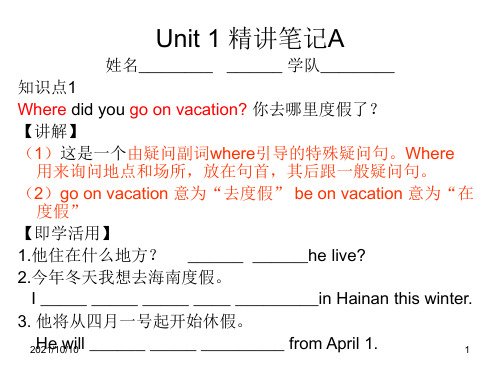
(4)皮皮想让你和他一起去游泳。 Pipi ______ you ______ ______ _____with him.
2021/10/10
9
• 知识点8
• The only problem was that there was nothing much to do in the evening but read. 唯一的问题是晚上除了读书没什 么事可做。
• (2)Anything special意为‘特别的东西’, Anything 为复合不定代词,类似的复合不定代词还有‘something’ ‘everything’ ‘nothing’ ‘someone’ ‘everyone’ ‘anyone’ ‘no one’ 。当形容词修饰他们时,放在其后。
• 我大部分时间只是待在家里读书、休息.
• 【讲解】most of the time 大部分时间,其中most为代词,意为
‘大部分,大多数,大体上’。 Most of … 意为‘…中的大多 数’,做主语时,谓语动词取决于most of 后修饰的名词。当of 后接代词时,代词用宾格。
• Stay at home 待在家里 • Most of time Lily studies hard. 大部分时间莉莉学习都很刻苦 • Most of us are going to the park. 我们大多数人都要去公园
Unit 1 精讲笔记A
姓名________ ______ 学队________
知识点1
Where did you go on vacation? 你去哪里度假了?
八年级上册英语第一单元a部分知识点

八年级上册英语第一单元a部分知识点英语是我们学习的必修课程之一。
在八年级上册英语第一单元A部分中,我们学习了很多基础语法和词汇知识。
在这篇文章中,我们将对这些知识点进行详细的讲解和总结。
一、动词1. 一般现在时一般现在时表示现在的状态或习惯动作,主语一般为第三人称单数时,要在动词后面加上“s”或“es”。
例如:He runs every morning.(他每天早上跑步。
)She brushes her teeth twice a day.(她每天刷牙两次。
)2. 现在进行时现在进行时表示现在正在进行的动作,用“be+现在分词”的形式来构成。
例如:I am studying English now.(我现在正在学习英语。
)They are playing basketball in the playground.(他们正在操场上打篮球。
)二、数词数词是表示数量的词语,分为基数词(表示数量的具体数值)和序数词(表示顺序)。
例如:There are ten apples on the table.(桌子上有十个苹果。
)My birthday is on the twelfth of January.(我的生日是在一月十二日。
)三、代词代词是代替名词的词语。
根据使用情况和功能,代词可以分为人称代词、物主代词、反身代词、指示代词、疑问代词和不定代词等。
例如:He is my friend.(他是我的朋友。
)This is my book.(这是我的书。
)四、形容词和副词1. 形容词形容词是用来修饰名词或代词的词语。
在英语语法中,一般放在名词或代词的前面。
例如:The blue sky is so beautiful.(蓝天很美。
)She is a kind girl.(她是一个善良的女孩。
)2. 副词副词是修饰动词、形容词或副词的词语。
在语法上,一般放在句子的末尾。
例如:He speaks English fluently.(他英语说得很流利。
- 1、下载文档前请自行甄别文档内容的完整性,平台不提供额外的编辑、内容补充、找答案等附加服务。
- 2、"仅部分预览"的文档,不可在线预览部分如存在完整性等问题,可反馈申请退款(可完整预览的文档不适用该条件!)。
- 3、如文档侵犯您的权益,请联系客服反馈,我们会尽快为您处理(人工客服工作时间:9:00-18:30)。
初中英语八下笔记Unit 1Section A1. You don’t look well.Well, a. 身体好=fine adv: do well; speak English well, sing well2.Look 系动词+ 形容词5+3Sounds great ,look beautiful, look handsome, look a bit redfeels hot / feels soft / feel cooltaste good/delicioussmell goodIt gets warmer and warmer now.It seemed ok/good at first/.Become bad/become worse.3.move . vt 移动,搬动1)Move sb I was moved into tears /touched by the story.2)Moved, a moving story4. take one’s temperature5. sound like +n/句子My dog looks like a child sometimes.6.That’s why you can’t move your neck .7. need to do8.sat in the same way for too long without movingWith---without doing9.advice: u. some advice// a piece of advice10. You should do / You ‘d better do / You can do / I t is good to do / It is better to do11. lie down and take a rest; go to a doctor, see a dentist12. hurt----hurt(1) 疼,痛,vi. My knee hurts now. 我膝盖疼。
My left leg hurts.(2) vt 伤害某人Your words hurt me.I was hurt by what you said.February 20th1.At 9 a.m. yesterday2.Was doing ….when 正在做某事。
突然。
When引导的时间状语从句。
主句:was doing; 从句:did.We were having English class when Mr Gong came in.I was playing games when my father came home.3. 1).see sb (宾格)doing 看见某人正在做某事(动名词做宾语补足语)Hear sb doing I hear MC talking/singing.feel sb doing I felt the earth moving when the earthquakehappened that night.2) See sb do 看见某人做某事(看到做某事的全过程)(动词原形做宾语补足语)Let’s watch WC play basketball. My mom watched me cross the road.3)See sb done 看见某人被。
(过去分词作宾语补足语)I saw him beaten by his father yesterday.这一类词叫使役动词,有10多个。
一感feel,二听listen to; hear ,三使let have make,四看see,watch,notice, observe 。
4.next to= close to .prep. 作定语。
The girl next to Miss Chen v. get close to nature靠近,亲近5.shout for = ask sb for sth.6. 1) 24-year-old a. 作前置定语。
A one-year-old baby; a thirteen-year –old boy.He is 13 years old. He is thirteen.He is a thirteen-year-old boy.2)A five-minute-ride 一段五分钟的路程= a five minutes’ rideA five-minute-walk 步行五分钟= a five minutes’ walk7.名词短语作同位语:即。
The bus drive, 24-year-old Wangping, stopped the bus without thinking twice.Mr Wu, headmaster of LieWu Middle school, is a great teacher. Miss Chen, head-teacher of Class 6, is a good teacher.8. with----- withoutWith 跟。
一起play … with sbHelp sb with sthWithout doing/n 没有。
9.get off get onto get in10.ask sb what happened/what is happening/what had happened11.she said (that) 句子宾语从句12.have a heart problem13.act:actor/actress 表扬=演,扮演。
角色action 行动,开始Activity n.活动activitiesAct .v act quickly14.told the passengers that 句子同11.15.take sb to…16.expect sb to do 希望某人做某事expect为动词,可意为“预料;期待;期望”。
★ expect to do sth. 意为“期待/ 期望做某事”。
如:I expect to be back within a week.★ expect sb. to do sth. 意为“预料/ 期待/ 期望某人做某事”。
如:Did you expect me to believe that?【运用】单项选择1. —Did you watch the football game yesterday?—Yes, I did. John is really a dark horse. Nobody ________ him to go so far.A. wantedB. expectedC. hoped (2016 内蒙古呼和浩特改编)2. Leonardo DiCaprio, a famous American actor, was always expecting ________ an Oscar and finally he made it.A. to winB. winningC. not to winD. not winning (2016 广东)17.to one’s surprise 令某人吃惊的是to everyone’s surprise18.agree to do同意做某事,答应做。
disagree,agreement, disagreement, agreed to do19.help sb to do, move …onto/into把。
搬上去,搬进去20.thanks to + n , 多亏。
多谢。
(介词短语)Thanks to Miss Xu, our math has improved a lot now.Thanks to the heavy rain, the farmers will have a good harvest this year.21.听力材料里面:The doctors saved the man in time.医生们及时救活了这个男子。
The man was saved in time. 这个男子被及时救活。
被动语态:be+done22. in time 及时on time 准时23.It is sad that 句子:it 做形式主语,真正主语是后面的句子。
It is good to have time to relax. It is easy to learn English. It is +adj +to do/ that 句子It is sad that a few experts , doctors and nurses died in the battle with Con-9……think of想起think over仔细考虑25. save one’s life The doctor saved their lives.Feb.241. 1. have a(n) + 疾病名称“have a(n) + 疾病名称”,表示患病,如:have a cold / fever / cough / stomachache / toothache等。
【拓展】表示不适、受伤的其他表达:◆“sb.+be / feel +某些形容词(如:tired, sick, ill)”表示某人感到不适。
如:I am / feel tired.◆“身体部位+be / feel+某些形容词(如:hot, sore)”表示某部位感到不适。
如:My head is / feels hot.◆“身体部位+hurt”表示某部位痛。
如:My left leg hurts.◆“get+某些动词的过去分词形式”表示受伤。
如:He got hit by a ball.◆“hurt / cut+具体部位/ 反身代词”表示某部位/ 自己受到伤害。
如:hurt my arm cut his finger hurt / cut himself【链接】用来询问疾病、不适或突发情况的句型:What’s the matter (with ...)?What’s the trouble (with ...)?What happened (to ...)?Is there anything wrong (with ...)?【运用】根据括号内的要求完成下列各题。
(1) —____________________________ (写出问句)—I have a cold.(2) 辛迪(Cindy)嗓子疼。
